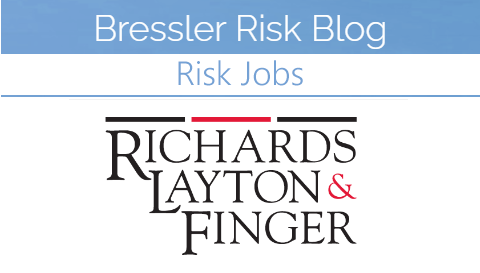Law Firm Risk Opinion and Advice — Cultivating Risk Staff Everywhere, Third-party CDD Rules in UK
Posted on
Rabiya Hirji touches on a topic we’ve observed increasing interest in: “Creating New Roles and Opportunities in Law Firm Risk Functions” —
- “When I started my career in law firm risk management over 25 years ago, the conflicts assistant/analyst/administrator was expected to fulfill a wide range of responsibilities including all aspects of matter opening, procuring details to respond to audit letters, preparing matter lists for lawyer departures, and maintaining client/matter data in financial systems. This wide range of duties and expectations not only put a lot of strain on these professionals; it also kept them from focusing on and specializing in specific areas and skillsets.”
- “A recent ILTA podcast, “New and Evolving Roles in Law Firm Risk Functions,” highlighted how new technology, changing client expectations, and regulatory changes are transforming law firm functions by creating opportunities for individuals to develop new skillsets — allowing firms and legal departments to rethink how they deliver their legal services.”
- “At some firms, risk teams are creating dedicated roles for specialized functions, such as conflicts clearance lawyers, risk systems administrators, client commitments analysts, and audit letter specialists. These niche roles let risk professionals develop new skill sets and specialize in specific areas of their choosing. At a time when “quiet quitting” and “the great resignation” have become common parlance, law firms should view this trend toward more specialized roles as an opportunity to retain talent.”
- “Risk professionals are re-assessing their positions and their career options more than ever, so firms that want to improve retention should give their professionals meaningful opportunities for professional growth and support their curiosity. By providing talented employees with interesting career opportunities and specialized roles, your firm can gain a competitive advantage in acquiring and retaining talent, and enhance your risk team’s overall success at the same time.”
[Note, the referenced podcast is available to ILTA members with sufficient access rights here.]
- “Short answer: Yes, there is a mechanism for ‘reliance’ in Regulation 39 of the Money Laundering Regulations 2017. There are, however, certain preconditions, risks and practical considerations. It should not be the default way for law firms to conduct CDD.”
- “The starting point is that the law firm should conduct client due diligence (CDD). However, CDD carried out by another ‘relevant person’ can also be relied upon in certain circumstances.”
- “Reliance can save time and work duplication, not to mention client frustration. For example, it might be a suitable way to deal with clients who are ‘passed on’ by another company in the law firm’s group. Or if you regularly work with another professional adviser in transactions, there is potential to streamline the onboarding process.”
- “The key point to understand is that the party relying on the CDD is responsible for it.”
- “If the party supplying the CDD (let’s say, the client’s accountant or estate agent) failed to do sufficient checks, the solicitor relying on the same documents would remain equally liable if the client turned out to be dodgy.”
- “There is an increased risk because circumstances may have changed since the original party conducted the CDD. Maybe the client moved, or a business gained new beneficial owners. It is imperative that the solicitor knows that the AML checks in front of them are fully up to date.”
- “And since CDD failures potentially carry criminal liability, there is a strong incentive for law firms to insist on doing their own AML checks.”
- “If you do go down the reliance route, it is not an informal process. There has to be a written agreement in place, where the original party agrees to provide CDD documents within two days of being asked for it. The parties must also agree to keep records in accordance with the Regulations.”









